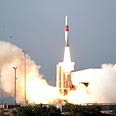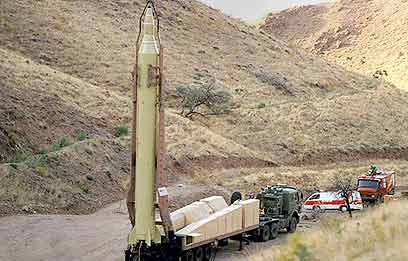
Is IDF ready for Cold War?
Special project: Is Israel ready for Iranian nuclear era? Security officials answer tough questions
Are we ready? This question resonates throughout Ynet's special project dealing with the Iranian nuclear threat. The answer to the question has many implications – political, economic, and humanitarian. Should Israel prepare its citizens for a "Cold War" situation, an ongoing nuclear threat from an eastern enemy, or is it better to wait, allay fears, and count on the world? Has the time come to invest resources in emergency plans in case of a genuine alarm? Or do we all prefer to stick our head in the sand and believe that "everything will be alright"?
By 2009 the lives of Israelis could change dramatically. The IDF Intelligence Branch believes that if the current rate of progress continues, Tehran will acquire a nuclear bomb by 2009, in essence forcing a Cold War situation on Israel, or worse if judging by the threats emanating from Tehran these days.
Security officials in Israel are united in the belief President Ahmadinejad's statements are not baseless.
"There hasn't been a more serious leader than him in recent years," a senior security official told Ynet. "Everything he says must be taken completely seriously, and even more than that."

Iranian Shehab missile (Photo: AFP)
But what's happening in practice? That's the tough question. The truth is that not that much is happening, as Israel is mostly monitoring developments in Iran from afar.
The IDF Home Front Command, responsible for protecting Israelis against such threats, has not received any order to prepare for the threat, even not in the form of future educational efforts. A senior IDF officer says the Iranian threat marks "the most complex cold confrontation facing the world and Israel."
"Anyone who thinks one aggressive act will bring about the end of this threat is wrong," Major-General (Res.) Meir Amit, the former head of the IDF Intelligence Branch and the Mossad, told Ynet.
"This is not the same situation as the case in Iraq. The deal here is much more complex. We must pin our hopes on international activity, punishments, sanctions, and hope this stops the nuclear race," he says. "Simultaneously, we must continue developing systems that would thwart firing at Israel. I’m not convinced the Arrow missile system is adequate to foil such threat."
Is Arrow the only answer?
Indeed, when it comes to intercepting incoming missiles, Israel counts on the Arrow, which already saw investment to the tune of USD 2.5 billion. A critical moment came at the end of 2005, with a complex experiment simulating the firing of an enemy missile at Israel. The system was able to identify the missile and destroyed it.
"We're talking about a very important test that showed Israel certainly has defense capabilities," a senior defense official said. "When talking about a military threat, we need to continue developing all the time and that's what we're doing. The Arrow system is certainly an important aspect (in defending) against any ballistic threat and certainly from Iran's direction."
However, Arrow critics say a barrage of missile could make the system ineffective. After all, it is enough that only one missile lands in Tel Aviv…
The there's the treat of counter-response: Israel, according to foreign publications, has three Dolphin submarines equipped with nuclear missiles. These submarines are meant to allow Israel to respond to an attack in the event ground nuclear bases are hit by a surprise attack. Israel apparently also possesses Jericho missiles capable of carrying a nuclear warhead. Meanwhile, Israel continues to equip itself with the F-16I jet fighters that have been arriving in the country starting in 2004. The airplane is the most cutting-edge jet fighter in the world and is equipped with sophisticated Israeli systems and various capabilities.
Then there's the new satellite, Eros B, launched recently and used to monitor Iran's nuclear program.
"When it comes to Iran, all the information is relayed to the Americans," a security source says.
Yet the Iranians are not idle either. According to defense sources, they are developing various systems and are acquiring missiles from North Korea, while developing their Shehab missiles.
"The efforts undertaken by Iran when it comes to developing missiles are immense," a defense official noted.
So what kind of future are we facing?
"What we'll see in the coming years could attest to how life in the Middle East may look like in the coming decades," the security official concludes. "In Israel we'll continue not only to closely monitor, but also to do things that are better kept silent. We'll enter a period of great tension and continue to develop both defensive and offensive means."
"Iran, on the other hand, will continue with the nuclear race, the arms race, and the international community will have to be more decisive because one day we'll discover it's too late," he said. "We must remember Iran learned from Iraq's mistakes. It's not the same thing. They're operating in several sites spread across the country and not all of them are known. They're operating in two different tracks. And who knows, maybe there's another secret track on the way to the nuke."
- Next article in series: Are Israel's civilian bodies preparing for a situation of a Cold War against Iran or for a nuclear attack?










